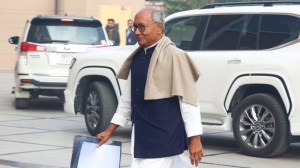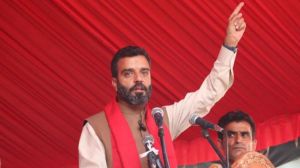Results foretold
On Monday, February 18, Pakistan goes to polls. The mood, as seen in its English media, is summarised in Zahid Hussain8217;s cover story...

On Monday, February 18, Pakistan goes to polls. The mood, as seen in its English media, is summarised in Zahid Hussain8217;s cover story in the February issue of Newsline: 8220;Never before in Pakistan8217;s history has an election campaign been so dull and lacklustre. The assassination of Benazir Bhutto casts a shadow of gloom, but it is also something to do with a lack of trust in the whole process.8221; He argues that the period immediately after the elections will see increased instability in Pakistan, a view that is shared by most analysts. The PPP, he says, will benefit from a post-Bhutto sympathy wave and do well in Punjab. Nawaz Sharif8217;s PML will do well too, with many politicians in the king8217;s party, the PML-Q, rushing to return to their original party. In Sindh, PPP is expected to dominate in rural areas, with the MQM holding urban areas. The PPP is also set to benefit from the MMA8217;s disintegration in the NWFP.
The PPP is expected to be the single largest party in the next National Assembly. 8220;President Pervez Musharraf8217;s greatest fear,8221; writes Hussain, 8220;is that the PPP and the PML-N will join hands, which would certainly mean an end to his presidency.8221; Musharraf is believed to be in touch with the PPP, and his team is also said to have tried to strike a deal with the PML-N, though success is unlikely.
Switching partners
In The Friday Times, Najam Sethi considers the scenario if PPP does not win a majority on its own. Would it partner the PML-N or PML-Q? 8220;It is doubtful if Sharif will come on board as long as President Musharraf is still on the Hill and the pre-PCO judges aren8217;t restored. If Asif Zardari is unable or unwilling to oblige Sharif on these two counts 8212; in fact if the judges were restored they would quickly band together to throw President Musharraf out on one pretext or another 8212; then he will have to make a coalition with the PML-Q. But he can extract a heavy price for sharing power with President Musharraf. If the president is inclined to hog the show or throw his weight about, Zardari could always exercise the option of joining with Sharif and stripping President Musharraf of his powers to appoint the army chief and dismiss governments and parliament or, if worse comes to worst, throwing him out.8221;
Kayani 038; Musharraf
In Daily Times February 15, Ejaz Haider looks at relations between Musharraf and his successor as army chief, Ashfaq Pervez Kayani. He argues: 8220;Any thinking army chief 8212; and Kayani is just that 8212; should at this point be concerned about two broad objectives: a restoring the army8217;s image and ensuring its organisational integrity; b performing effectively against internal threats.8221; The first goal demands distancing the army from politics. Given the tenor of Musharraf8217;s tenure, this involves separating the civil and military spheres. Kayani has already asked his officers to keep away from politics and politicians, and he has recalled army personnel from civil posts. But: 8220;Kayani knows that until Musharraf is hanging in there, the army cannot really disengage from politics. Those who want Musharraf out look towards Kayani to do it, even as they want to see Musharraf8217;s back because they argue for civilian supremacy.8221; There8217;s some contradiction there, he points out. Yet: 8220;One good thing about the mess since March 9, 2007 is the realisation in the army that it has spread itself thin and does not have the capacity to act beyond its professional brief without accumulating a cost that may not be bearable. This realisation is partly owed to the beating its image has taken among the people but mostly because it has continuously under-performed in the face of the internal threat Pakistan faces. Kayani knows that trying to hold on to everything means the army will end up holding nothing. Extricating from politics is easier because it reduces non-professional cost and, as bonus, bestows on the army a better image.8221;
Semi finals?
Khaled Ahmed in The Friday Times looks at possible instability after the elections this way: 8220;Pakistan8217;s governability is in doubt, which means another election will be demanded soon enough after the next government is shell-shocked by the challenges of governance it faces and loses its head. The writ of the state would be the first challenge that it will fail to address because it would also be busy fulfilling pledges of 8216;sorting out the army8217;. Almost 60 per cent of Pakistan is today without the writ of the state. After that, the government will have to tackle the snowball of deferred economic crises that would be rolling down at it at great speed.8221;
mini.kapoorexpressindia.com
- 01
- 02
- 03
- 04
- 05































